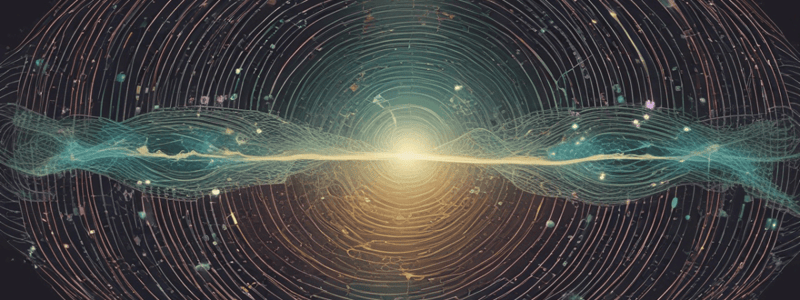Podcast
Questions and Answers
What is the principle that states that certain properties of a quantum object cannot be precisely known at the same time?
What is the principle that states that certain properties of a quantum object cannot be precisely known at the same time?
- Superposition
- Entanglement
- Wave-Particle Duality
- Uncertainty Principle (correct)
What is a quantum system that can exist in two states, similar to a classical bit?
What is a quantum system that can exist in two states, similar to a classical bit?
- Wave Function
- Quantum Harmonic Oscillator
- Quantum Bit (Qubit) (correct)
- Schrödinger Equation
What is the process by which a quantum system collapses from a superposition of states to a single state?
What is the process by which a quantum system collapses from a superposition of states to a single state?
- Quantum Decoherence
- Quantum Computing
- Quantum Cryptography
- Quantum Measurement (correct)
Flashcards are hidden until you start studying
Study Notes
Quantum Mechanics
Key Principles
- Wave-Particle Duality: Quantum objects (e.g. electrons, photons) can exhibit both wave-like and particle-like behavior.
- Uncertainty Principle: It is impossible to know certain properties (e.g. position, momentum) simultaneously with infinite precision.
- Superposition: Quantum objects can exist in multiple states simultaneously.
- Entanglement: Quantum objects can be connected in such a way that the state of one object is dependent on the state of the other.
Quantum States
- Wave Function: A mathematical function that describes the quantum state of a system.
- Schrödinger Equation: A mathematical equation that describes how the wave function changes over time.
Quantum Measurement
- Observation: The act of measuring a quantum system, which causes the system to collapse from a superposition of states to a single state.
- Quantum Decoherence: The loss of quantum coherence due to interactions with the environment.
Quantum Systems
- Quantum Bit (Qubit): A quantum system that can exist in two states, similar to a classical bit.
- Quantum Harmonic Oscillator: A system that oscillates at a specific frequency, used to model quantum systems.
Quantum Applications
- Quantum Computing: A new paradigm for computing that uses quantum mechanics to perform operations on data.
- Quantum Cryptography: A method of secure communication that uses quantum mechanics to encode and decode messages.
- Quantum Teleportation: A process that allows for the transfer of quantum information from one location to another without physical transport of the information.
Key Principles of Quantum Mechanics
- Quantum objects, such as electrons and photons, can exhibit both wave-like and particle-like behavior, demonstrating wave-particle duality.
- The uncertainty principle states that certain properties, like position and momentum, cannot be known simultaneously with infinite precision.
- Quantum objects can exist in multiple states simultaneously, a phenomenon known as superposition.
- Entangled quantum objects are connected in such a way that the state of one object is dependent on the state of the other.
Quantum States
- A wave function is a mathematical function that describes the quantum state of a system.
- The Schrödinger equation is a mathematical equation that describes how the wave function changes over time, governing the evolution of a quantum system.
Quantum Measurement
- The act of observing a quantum system causes it to collapse from a superposition of states to a single state, known as observation.
- Quantum decoherence is the loss of quantum coherence due to interactions with the environment, leading to the collapse of the wave function.
Quantum Systems
- A quantum bit (qubit) is a quantum system that can exist in two states, similar to a classical bit.
- A quantum harmonic oscillator is a system that oscillates at a specific frequency, used to model quantum systems, such as atoms and molecules.
Quantum Applications
- Quantum computing is a new paradigm for computing that uses quantum mechanics to perform operations on data, with potential exponential speedup over classical computers.
- Quantum cryptography uses quantum mechanics to encode and decode messages, providing secure communication.
- Quantum teleportation is a process that allows for the transfer of quantum information from one location to another without physical transport of the information.
Studying That Suits You
Use AI to generate personalized quizzes and flashcards to suit your learning preferences.




